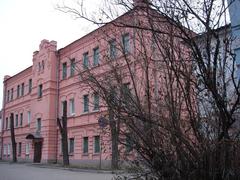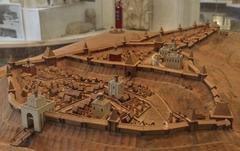Golden Gate Vladimir Russia: Visiting Hours, Tickets & Historical Sites Guide
Date: 14/06/2025
Introduction: A Medieval Marvel at the Heart of Vladimir
The Golden Gate of Vladimir, Russia, stands as a striking testament to the architectural ingenuity and cultural significance of medieval Rus’. Erected between 1158 and 1164 under Prince Andrei Bogolyubsky, this iconic monument served as both a ceremonial entrance and a formidable defensive structure, symbolizing the spiritual and political prestige of the Vladimir-Suzdal Principality. Drawing inspiration from the famed Golden Gates of Kiev and Constantinople, Vladimir’s Golden Gate is crowned by a small church dedicated to the Deposition of the Robe of the Virgin, reflecting the union of military strength and spiritual protection (UNESCO; Russia Beyond).
Surviving the Mongol invasion of 1237–1238 and multiple restorations, the Golden Gate today operates as a museum and a symbol of Vladimir’s enduring legacy. This comprehensive guide details the monument’s history, cultural importance, practical visitor information, and tips for enriching your exploration of one of Russia’s most celebrated UNESCO World Heritage sites.
Table of Contents
- Origins and Construction of the Golden Gate
- Strategic and Symbolic Significance
- The Mongol Invasion and Later Modifications
- Architectural Features and Innovations
- The Golden Gate in Vladimir’s Urban Development
- Cultural and Religious Significance
- Visiting the Golden Gate: Hours, Tickets, and Accessibility
- Travel Tips and Nearby Attractions
- Frequently Asked Questions (FAQ)
- Conclusion and Final Recommendations
- References
Origins and Construction of the Golden Gate
Commissioned by Prince Andrei Bogolyubsky during Vladimir’s rise as a political and spiritual center, the Golden Gate was built between 1158 and 1164. Its white limestone construction and massive arched passageway were inspired by the Golden Gates of Kiev and Constantinople, symbolizing the city’s aspirations to rival these illustrious centers of Eastern Christianity (UNESCO; Russia Beyond).
The structure originally featured defensive towers and a church atop the arch, blending military and religious functions—a unique innovation in medieval Russian architecture.
Strategic and Symbolic Significance
Strategically positioned at Vladimir’s western entrance, the Golden Gate was integral to the city’s defense and commerce (Encyclopaedia Britannica). It also served as a ceremonial gateway for princes, ambassadors, and dignitaries, reinforcing Vladimir’s political authority and religious importance.
Its architectural grandeur and gilded dome echoed the glory of Jerusalem and Constantinople, asserting Vladimir’s claim as a new spiritual capital.
The Mongol Invasion and Later Modifications
During the Mongol invasion of 1237–1238, Vladimir was besieged and much of it destroyed, but the Golden Gate endured, albeit damaged (UNESCO; Facts and Details). Restoration efforts, especially under Catherine the Great in the 18th century, reinforced the structure with brick and removed the original defensive towers, but preserved the core limestone arch (Russia Travel).
Architectural Features and Innovations
The Golden Gate’s central archway (about 14 meters high and 6 meters wide) allowed for the passage of cavalry and carriages. The church dedicated to the Deposition of the Robe of the Virgin atop the gate underscored the integration of spiritual and civic authority (Russia Beyond). Gilded copper sheets once adorned its oak doors, creating a resplendent effect in the sunlight (UNESCO; VisitRussia).
The Golden Gate in Vladimir’s Urban Development
As part of Prince Andrei’s vision, the Golden Gate anchored a program of fortification and monumental construction that redefined Vladimir’s skyline alongside the Assumption Cathedral and Cathedral of St. Demetrius (Encyclopaedia Britannica). The area around the gate became a vibrant district of commerce and governance, reflecting the city’s growing economic and cultural prominence.
Cultural and Religious Significance
Symbolism and Sacred Tradition
The Golden Gate’s design and location mirrored the sacred gates of other great Christian cities. The church atop the gate, dedicated to the Deposition of the Virgin’s Robe, symbolized the Virgin’s protection of Vladimir—echoing similar dedications in Constantinople and Kiev (SpottingHistory; Tourism33.ru; UNESCO; Advantour).
Passing through the gate was ritually significant, marking entry into the sanctified city. This tradition persists: walking beneath the arch is considered auspicious, especially for newlyweds (Facts and Details; Tourism33.ru).
Artistic Legacy
The Golden Gate exemplifies “white-stone architecture,” celebrated for its harmonious proportions, carved limestone, and integration with the landscape. Its fusion of military and ecclesiastical elements influenced later Russian city gates (UNESCO).
Historical Endurance and UNESCO Status
Having survived invasions and centuries of change, the Golden Gate is a symbol of resilience. It is part of the “White Monuments of Vladimir and Suzdal,” a UNESCO World Heritage Site recognized for its universal value and careful preservation (UNESCO).
Living Traditions
The gate remains a focal point for local celebrations and rituals. Its image adorns souvenirs and city branding, and it continues to inspire pride among Vladimir’s residents (Tourism33.ru).
Visiting the Golden Gate: Hours, Tickets, and Accessibility
Hours and Ticket Information
- Open: Tuesday to Sunday, 10:00 AM – 6:00 PM (last admission 5:30 PM)
- Closed: Mondays
- Admission: 200–300 RUB for adults; discounts for children, students, and seniors. Free entry for children under 7.
- Guided Tours: Available in Russian and other languages for an additional fee (Trip.com).
Buying Tickets
Tickets are available at the ticket office at the base of the monument or online via authorized platforms. Advance purchase is recommended during peak periods.
Accessibility
Due to the gate’s historic architecture, access to the upper museum requires climbing steep stairs; there is no elevator. The exterior is accessible to all, but those with mobility challenges may find the upper levels difficult to reach. Assistance is available on request.
Facilities
Restrooms are available nearby, and the surrounding area offers cafes, souvenir shops, and seating.
Travel Tips and Nearby Attractions
- Combine Your Visit: The Golden Gate is close to the Assumption Cathedral and Cathedral of St. Demetrius, both UNESCO-listed and within walking distance.
- Other Sites: The Vladimir History Museum, the Chambers, and the Water Tower are also nearby.
- Transportation: The Golden Gate is centrally located; Vladimir’s train station is about 1.5 km away. Public buses and taxis provide easy access.
- Best Time to Visit: Spring and summer bring pleasant weather and city festivals; winter offers a picturesque, snowy backdrop.
- Photography: Non-flash photography is permitted throughout the museum. Tripods may require special permission.
Frequently Asked Questions (FAQ)
Q: What are the Golden Gate Vladimir visiting hours?
A: Open Tuesday–Sunday, 10:00 AM–6:00 PM; closed on Mondays.
Q: How much are tickets?
A: 200–300 RUB for adults; discounts for children, students, and seniors; free for children under 7.
Q: Are guided tours available?
A: Yes, in Russian and other languages, for an additional fee.
Q: Is the Golden Gate accessible for visitors with disabilities?
A: The ground-level is accessible, but upper levels are only accessible via stairs.
Q: What other sites are nearby?
A: Assumption Cathedral, Cathedral of St. Demetrius, Vladimir History Museum.
Conclusion and Final Recommendations
The Golden Gate of Vladimir is a must-see for anyone interested in Russian medieval history, architecture, and spirituality. Its enduring structure, storied past, and captivating exhibits offer a window into Vladimir’s golden age and Russia’s cultural heritage. By combining your visit with other nearby attractions and utilizing guided tours, you will gain a deeper understanding of this remarkable monument’s significance (Russia Beyond; Tourism33.ru).
For the best experience, plan your trip around official visiting hours, purchase tickets early during peak seasons, and consult local tourism resources for special events. Embrace the traditions, admire the artistry, and let the Golden Gate be your gateway to the wonders of Vladimir’s UNESCO-listed heritage.
References
- UNESCO - White Monuments of Vladimir and Suzdal
- Golden Gate Vladimir: History and Guide - SpottingHistory
- Tourism33.ru - Golden Gate Vladimir
- Golden Gate Vladimir: Visiting Hours, Tickets & Guide - TravelTriangle
- Express to Russia - Golden Ring Tours
- Russia Beyond - Golden Gate Vladimir
- Facts and Details - Golden Gate Vladimir
- Russia Travel - Golden Gate Vladimir
- Trip.com - Golden Gate Guide
- Advantour - Golden Gate Vladimir
- VisitRussia - Golden Gate Vladimir
Image Credits: Vladimir Tourism Board, licensed for editorial use.


